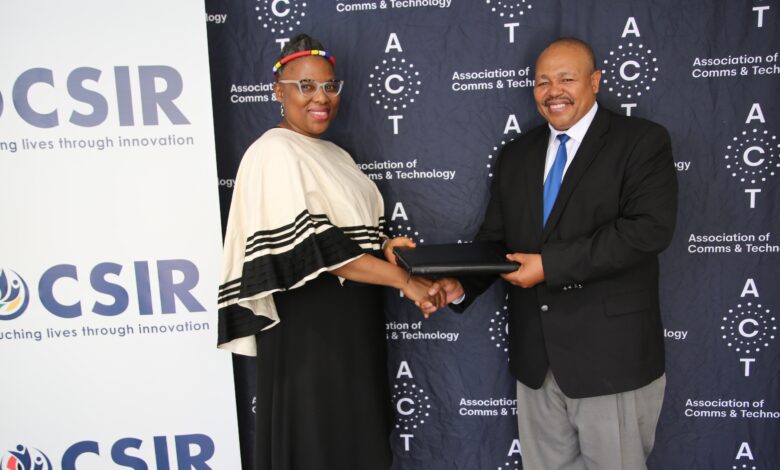CSIR And ACT Collaborate To Strengthen Cybersecurity

CSIR And ACT Collaborate To Strengthen Cybersecurity. The Council for Scientific and Industrial Research (CSIR) has recently entered a memorandum of understanding (MoU) with the Association of Communications and Technology (ACT). This collaboration is geared towards advancing diverse initiatives focused on accelerating technological innovations in cybersecurity, telecommunications and fourth industrial revolution (4IR)-related fields.
The MoU between the two parties will result in the establishment of joint initiatives aimed at strengthening the cybersecurity of mobile networks and safeguarding customer data and privacy. This includes joint efforts in researching and developing cybersecurity technologies, protocols and standards. Moreover, the agreement between the CSIR and ACT holds significant importance as it provides a framework for leveraging synergies. This collaboration will enable the undertaking of strategic projects aligned with the mandates of both organisations. The CSIR’s objectives and ACT’s commitment to addressing policy, research and development, telecommunications and security challenges in the communications and technology sector, serving both the public and private ecosystems, will be effectively fulfilled through this partnership.
During the signing ceremony in Pretoria, Dr Jabu Mtsweni, the Head of the Information and Cybersecurity Centre at the CSIR, emphasised that this collaboration is a step towards strengthening cybersecurity in the telecommunications industry to curb cybercrime, as well as establish technological innovations in cybersecurity and telecommunications.
“The collaboration focuses on various interventions in the communications and telecommunications sector, including capacity building and training, cybersecurity, data analytics and insights, spectrum management, industry development and others. These are meant to address digital transformation in the ecosystem, including supporting interventions for dealing with economic sabotage of physical and digital infrastructure, 2G/3G migration, spectrum social obligations, cost-effective energy solutions for the sector and country, as well as the development of the digital roadmap that includes future technologies with universal accessibility and connectivity,” added Dr Mtsweni.
Furthermore, the CSIR and ACT aim to enhance the skills and knowledge of network operators (NOs) and CSIR staff. Additionally, their objective is to cultivate a skilled workforce for the future, engaging in joint advocacy efforts and collaborative initiatives with regulatory authorities. These efforts are geared towards promoting a fair and competitive regulatory environment for NOs. The partnership also involves collaboration on spectrum governance, allocation and the efficient use of spectrum to support the development of new services and technologies, including the International Mobile Telecommunication systems and the internet of things.
Another key area of collaboration is in innovation and entrepreneurship, with both parties sharing strong strategic objectives of innovation and entrepreneurship, particularly within small, medium and micro enterprises (SMMEs). This partnership is founded on industry development and the transformation of the communications and telecommunications sector by advocating for fit-for-purpose modern policies that are aligned with South Africa’s social obligations, working with industry to innovate solutions that address socio-technical challenges in the telecommunications ecosystem, such as universal accessibility and connectivity, security of digital infrastructure and energy solutions.
ACT CEO, Nomvuyiso Batyi, highlighted some of the most pressing challenges currently facing the sector, emphasisng that “in the rapidly evolving landscape of the telecommunications industry, socio-technical challenges stand as formidable obstacles. The intricate interplay between social and technological elements introduces complexities that demand innovative solutions. We witness the manifestation of these challenges, particularly in the transition from 2G to 3G networks. At ACT, we are unwavering in our commitment to finding viable solutions to ensure that this migration doesn’t leave anyone behind. Through dedicated research and development efforts, we aim to bridge the gap and facilitate a seamless transition for all users, ultimately fostering a more inclusive and connected digital future.”




